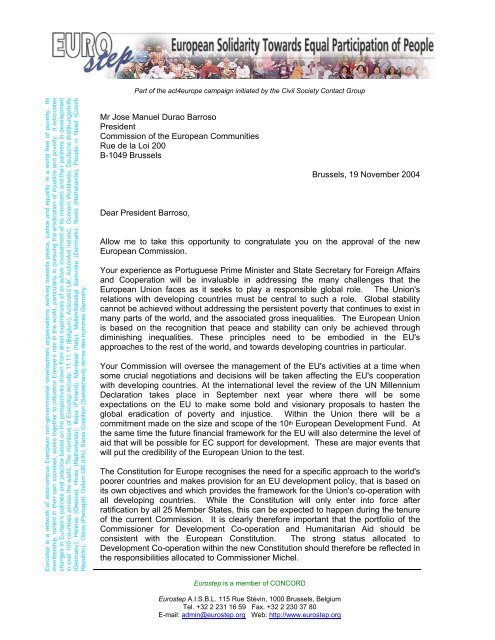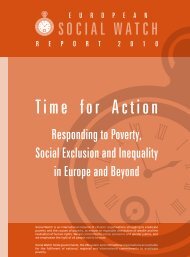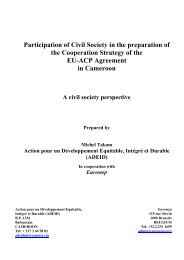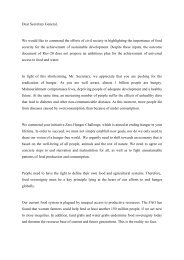A letter to the European Commission President Jose ... - Eurostep
A letter to the European Commission President Jose ... - Eurostep
A letter to the European Commission President Jose ... - Eurostep
Create successful ePaper yourself
Turn your PDF publications into a flip-book with our unique Google optimized e-Paper software.
<strong>Eurostep</strong> is a network of au<strong>to</strong>nomous <strong>European</strong> non-governmental development organisations working <strong>to</strong>wards peace, justice and equality in a world free of poverty. Its<br />
membership, rooted in <strong>the</strong>ir own societies, works <strong>to</strong>ge<strong>the</strong>r <strong>to</strong> influence Europe’s role in <strong>the</strong> world, particularly in pursuing <strong>the</strong> eradication of injustice and poverty. It advocates<br />
changes in Europe’s policies and practice based on <strong>the</strong> perspectives drawn from direct experiences of an active involvement of its members and <strong>the</strong>ir partners in development<br />
in over 100 countries across <strong>the</strong> world. The members of <strong>Eurostep</strong> include: 11.11.11 (Belgium), ActionAid UK, ActionAid Ireland, Concern Worldwide, Deutsche Welthungerhilfe<br />
(Germany), Helinas (Greece), Hivos (Ne<strong>the</strong>rlands), Kepa (Finland), Manitese (Italy), Mellemfolkeligt Samvirke (Denmark), Novib (Ne<strong>the</strong>lands), People in Need (Czech<br />
Republic), Oikos (Portugal), Oxfam GB (UK), Swiss Coalition (Switzerland), terres des hommes Germany.<br />
Part of <strong>the</strong> act4europe campaign initiated by <strong>the</strong> Civil Society Contact Group<br />
Mr <strong>Jose</strong> Manuel Durao Barroso<br />
<strong>President</strong><br />
<strong>Commission</strong> of <strong>the</strong> <strong>European</strong> Communities<br />
Rue de la Loi 200<br />
B-1049 Brussels<br />
Dear <strong>President</strong> Barroso,<br />
<strong>Eurostep</strong> is a member of CONCORD<br />
<strong>Eurostep</strong> A.I.S.B.L. 115 Rue Stévin, 1000 Brussels, Belgium<br />
Tel. +32 2 231 16 59 Fax. +32 2 230 37 80<br />
E-mail: admin@eurostep.org Web: http://www.eurostep.org<br />
Brussels, 19 November 2004<br />
Allow me <strong>to</strong> take this opportunity <strong>to</strong> congratulate you on <strong>the</strong> approval of <strong>the</strong> new<br />
<strong>European</strong> <strong>Commission</strong>.<br />
Your experience as Portuguese Prime Minister and State Secretary for Foreign Affairs<br />
and Cooperation will be invaluable in addressing <strong>the</strong> many challenges that <strong>the</strong><br />
<strong>European</strong> Union faces as it seeks <strong>to</strong> play a responsible global role. The Union's<br />
relations with developing countries must be central <strong>to</strong> such a role. Global stability<br />
cannot be achieved without addressing <strong>the</strong> persistent poverty that continues <strong>to</strong> exist in<br />
many parts of <strong>the</strong> world, and <strong>the</strong> associated gross inequalities. The <strong>European</strong> Union<br />
is based on <strong>the</strong> recognition that peace and stability can only be achieved through<br />
diminishing inequalities. These principles need <strong>to</strong> be embodied in <strong>the</strong> EU's<br />
approaches <strong>to</strong> <strong>the</strong> rest of <strong>the</strong> world, and <strong>to</strong>wards developing countries in particular.<br />
Your <strong>Commission</strong> will oversee <strong>the</strong> management of <strong>the</strong> EU's activities at a time when<br />
some crucial negotiations and decisions will be taken affecting <strong>the</strong> EU's cooperation<br />
with developing countries. At <strong>the</strong> international level <strong>the</strong> review of <strong>the</strong> UN Millennium<br />
Declaration takes place in September next year where <strong>the</strong>re will be some<br />
expectations on <strong>the</strong> EU <strong>to</strong> make some bold and visionary proposals <strong>to</strong> hasten <strong>the</strong><br />
global eradication of poverty and injustice. Within <strong>the</strong> Union <strong>the</strong>re will be a<br />
commitment made on <strong>the</strong> size and scope of <strong>the</strong> 10 th <strong>European</strong> Development Fund. At<br />
<strong>the</strong> same time <strong>the</strong> future financial framework for <strong>the</strong> EU will also determine <strong>the</strong> level of<br />
aid that will be possible for EC support for development. These are major events that<br />
will put <strong>the</strong> credibility of <strong>the</strong> <strong>European</strong> Union <strong>to</strong> <strong>the</strong> test.<br />
The Constitution for Europe recognises <strong>the</strong> need for a specific approach <strong>to</strong> <strong>the</strong> world's<br />
poorer countries and makes provision for an EU development policy, that is based on<br />
its own objectives and which provides <strong>the</strong> framework for <strong>the</strong> Union's co-operation with<br />
all developing countries. While <strong>the</strong> Constitution will only enter in<strong>to</strong> force after<br />
ratification by all 25 Member States, this can be expected <strong>to</strong> happen during <strong>the</strong> tenure<br />
of <strong>the</strong> current <strong>Commission</strong>. It is clearly <strong>the</strong>refore important that <strong>the</strong> portfolio of <strong>the</strong><br />
<strong>Commission</strong>er for Development Co-operation and Humanitarian Aid should be<br />
consistent with <strong>the</strong> <strong>European</strong> Constitution. The strong status allocated <strong>to</strong><br />
Development Co-operation within <strong>the</strong> new Constitution should <strong>the</strong>refore be reflected in<br />
<strong>the</strong> responsibilities allocated <strong>to</strong> <strong>Commission</strong>er Michel.
The new Constitutional treaty lays <strong>the</strong> legal foundations for a strong and active <strong>European</strong><br />
development policy. However, we would like <strong>to</strong> draw your attention on one point.<br />
Experience has shown that <strong>the</strong> effective execution of <strong>European</strong> Union policies requires<br />
collaboration, co-ordination and strict control between <strong>the</strong> bodies that create policy and<br />
those that implement it. As <strong>the</strong> <strong>European</strong> <strong>Commission</strong>er in charge of development, Louis<br />
Michel is responsible for DG Development, establishing policies that concern <strong>the</strong> African,<br />
Caribbean and Pacific (ACP) countries. The responsibility for managing relations with o<strong>the</strong>r<br />
developing countries will formally rest with o<strong>the</strong>r Direc<strong>to</strong>rates General and policies relating<br />
<strong>to</strong> <strong>the</strong>m will be <strong>the</strong> responsibility of <strong>the</strong> <strong>Commission</strong>ers for external relations and for<br />
Europe's neighbourhood policy.<br />
Fur<strong>the</strong>rmore in its evaluation of <strong>the</strong> hearing with <strong>the</strong> new <strong>Commission</strong>er for Development,<br />
<strong>the</strong> Committee on Development within <strong>the</strong> <strong>European</strong> Parliament "expressed its deep<br />
concern regarding <strong>the</strong> distribution of competences in <strong>the</strong> new <strong>Commission</strong>, notably <strong>the</strong><br />
reduction of <strong>the</strong> Development <strong>Commission</strong>er's authority over EuropeAid, which is seriously<br />
detrimental <strong>to</strong> development cooperation".<br />
We are concerned that this division of responsibilities for developing countries between<br />
different portfolios within <strong>the</strong> <strong>Commission</strong> will not only lead <strong>to</strong> inconsistencies in <strong>the</strong> EC's<br />
relations with developing countries, but will undermine <strong>the</strong> effectiveness of <strong>the</strong> EC's aid<br />
programme – particularly in <strong>the</strong> EC's support for achieving <strong>the</strong> international development<br />
strategy set out in <strong>the</strong> UN Millennium Declaration. It is difficult <strong>to</strong> see how <strong>the</strong><br />
<strong>Commission</strong>er for Development Co-operation and Humanitarian Aid can effectively ensure<br />
that <strong>the</strong> EU's development policy is consistently applied <strong>to</strong>wards cooperation with<br />
developing countries if he does not have jurisdiction over EuropeAid, or over <strong>the</strong> policy and<br />
programming processes for developing countries outside <strong>the</strong> ACP group.<br />
We hope that with parliament's endorsement for <strong>the</strong> <strong>Commission</strong> you will now be in a<br />
position <strong>to</strong> finalise <strong>the</strong> portfolios of individual <strong>Commission</strong>ers <strong>to</strong> ensure that <strong>the</strong>y not only<br />
reflect <strong>the</strong> provisions of <strong>the</strong> new Constitution, but also ensure consistency of purpose with<br />
<strong>the</strong> policy objectives for which <strong>the</strong> <strong>Commission</strong>ers have been assigned responsibility.<br />
Yours sincerely,<br />
Simon S<strong>to</strong>cker<br />
Direc<strong>to</strong>r<br />
Cc:<br />
Louis Michel<br />
<strong>Commission</strong>er for Development Co-operation and Humanitarian Aid









